
Let's stroll down memory lane, shall we?
The 1990's was a decade of distinct personalities, fads, discoveries and disasters. Back in 1997 cloning was first being whispered in the popular western media and then began a firestorm debate, to this date, with the successful first clone of an animal, the infamous sheep "Dolly" in Scotland. In April of 1990 the Hubble Space Telescope was first launched. In January of 1991 Allied forces launched an attacked on Iraqi occupied Kuwait kicking off The Persian Gulf War. Famous sports greats like hockey's Wayne Gretzky and basketball's Michael Jordan retired. In 1997 Diana, Princess of Wales, was killed in a horrific car accident. The wonderful Godsend to the home video format, DVD, was introduced in 1996 and soon became the fastest selling home video/audio format of all-time. And who the hell could forget the ridiculous paranoia than was Y2K, not to mention the zealot-like craze that was Pokemon, Tickle Me Elmo, Beanie Babies, MC Hammer and Vanilla Ice?
Well, the world of cinema was equally topsy-turvy.
The 1990's are a decade that I will probably most fondly remember. It was the decade that I made the slow and painfully awkward transition form adolescence to adulthood, and my eyes began to truly open up to what the cinema really had to offer. It was during these ten formative years that I probably began to completely watch films with an astute and openly critical eye, and my exposure to films increased by leaps and bounds. Yes, I still saw a considerable amount of garbage that the modern studios churned out with the subtlety of a flying hammer, but I also saw great films whose influence can still be felt to this day.
I humbly offer up my TEN BEST FILMS of the 1990's (my first such decade list that will continue on with the 80's, 70's and 60's in the future) in much of the same way as I have my lists of the BEST FILMS of the year: they are overwhelmingly my personal choices and bare a sensitive connection to me and me alone. Yes, there were a great number of noteworthy accomplishments from this period, and there are surly too many fantastic films to make a streamlined list of the top ten. Nevertheless, I offer up my picks of films that I strongly feel were the decade's most illustrious works, but I also must mention that I tried to keep the list as eclectic as possible. I am not going to turn away blockbusters for their own sake, nor am I going to include, by default, films that were worshipped by professional critics and fans as a way of appeasing them. I am not going to put THE SHAWSHANK REDEMPTION or BRAVEHEART down because they were so universally loved, nor am I going to list works like HOOP DREAMS or LEAVING LAS VEGAS because critics were unanimous in expressing accolades for them.
This is my list, as I see it.
So, here we go...
WATCH me talk about some of my picks on CTV:
1. GOODFELLAS (1990)
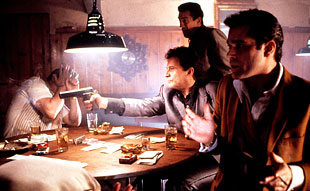
Make no mistake about it, Martin Scorsese is the greatest living American director. He made the best film of the 1970's (TAXI DRIVER), the best film of the 1980's (RAGING BULL) and he most definitely made the truly best film of the 1990's in GOODFELLAS, an epic, sprawling, real life retelling of the rise and fall of real life mobster Henry Hill. GOODFELLAS represents Scorsese at his absolute peak, with a command, mastery, and sure-fire confidence ever the material that has been a staple of his work since he started making similar themed films with MEAN STREETS in the early 70's. GOODFELLAS is the best of the mob pictures. Yes, GODFATHER is a great film as is SCARFACE, but GOODFELLAS goes further with the material and the characters and their stories resonate with more depth and urgency. Not only that, but we also get Scorsese's virtuoso eye for the most minute of details, and his command over the visuals, camera work, and music have been referenced by so many future filmmakers, from Tarantino to Anderson, both Wes and P.T.. GOODFELLAS is the 1990's most complete masterpiece.
2. PULP FICTION (1994)

Tarantino's second film making the list of the ten best? Answer: Correctomundo! It is clearly the most original, colorful, and offbeat films of the decade, and just may be the finest written. Tarantino and collaborator Roger Avary present a wonderfully diverse and disjointed narrative about all types of lowlife scum and make it all work and mesh together with a sort of maddening cadence. The film marked the emergence of Tarantino as the freshest and most natural new director in American cinema since Scorsese, and his wonderfully colloquial and scatological dialogue reveals him as the heir apparent of David Mamet. The great thing about FICTION, other than its labyrinthine and broken plot structure, is just how much character he gives his characters, who are all allowed to breathe life with dialogue that is ripe with pop culture references and devilishly amusing asides. PULP FICTION is vulgar, crude, intense, funny, and exciting, and its influence still can be felt in lesser wanna-be screenplays. Tarantino's work here represents a landmark achievement and is indicative of his passion for film.
3. J.F.K. (1991)

This 1991 film represents a career-high work for director Oliver Stone, who previously tackled the turbulent 60's in films like PLATOON and BORN ON THE FOURTH OF JULY. This time he grapples with the complexity and troubling assassination of President John F. Kennedy. J.F.K. is a dense, atmospheric, and utterly involving exploration into District Attorney Jim Garrison's attempts to unravel the true nature of the death of one of the most endearing US Presidents. This is a film that is largely a dramatic piece, and people that fault it for its lack of objectivity or historical accuracy miss the point altogether. Like the documentaries of Michael Moore after him, Stone uses the film as a visual essay to provide his own subjective editorial, so to speak, on his thoughts on who killed Kennedy. Yes, he takes dramatic liberties, but the film never tries to pander to its audience and pretend to be fact, but rather an incredible mosaic of interlocking theories and pontifications which ultimate unravels and weaves together into Stone's own conclusions. The film is completely transfixing, and whether you agree with Stone or not, he still made an accomplished piece of "what if" entertainment that made people talk.
4. BOOGIE NIGHTS (1997)
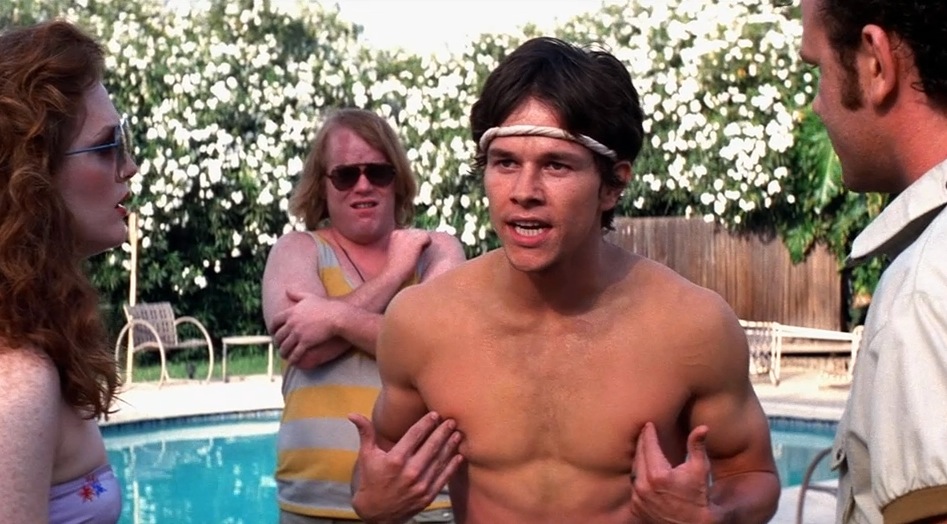
BOOGIE NIGHTS might be one of my favorite films of the 1990's, a remarkably self-confident, stylish, and broadly scoped film by then sophomore director P.T. Anderson. Like the great character pieces of Robert Altman, Anderson spun a tale of the rise and inevitable fall of a teen porn star with a large and wonderfully realized supporting cast that interweaves successfully as a whole. The film marked a brief comeback for Burt Reynolds, who in his role of porn director Jack Horner provided us with his best performance since DELIVERANCE, and introduced us to Mark Wahlberg as an actor of range. The film is funny, touching, sad, and one that sort of pays homage to the strange and lurid world of pornography while condemning it at the same time. It's even-handed approach to its subject matter is revealing in the sense that, despite the fact that the characters occupy a pungent world that turns off many, they are nevertheless a family in a weird and twisted sort of way. BOOGIE NIGHTS remains to be one of the 1990's great underrated and least appreciated films.
5. DANCES WITH WOLVES (1990)

If anyone would have told me, say, 20 years ago that Kevin Costner, in only his second film as a director, would eventually beat Martin Scorsese and win "Best Director" at the 1990 Academy Awards, I would have laughed. But win he did, and his 1990 epic DANCES WITH WOLVES won the novice director a Best Director trophy and went on the win Best Picture as well. This is not being said to discredit the film in any way, as it is a terrifically realized western that did an effective job of dismantling common-place western archetypes. This is arguably the first film to treat Native Americans with respect and dignity and avoided the stereotypes that plagued other lesser Westerns in the past. This film follows the reconstruction period after the Civil War and the efforts of a war hero (Costner) to foster a friendship with his fellow Native tribes that share the land with him. The film ushered in the reemergence of the western genre, and its scope, pageantry, and poignant storytelling are reminders of the types of breathtaking films that can be made in old fashioned ways with new methods to present characters.
6. SCHINDLER'S LIST (1993)
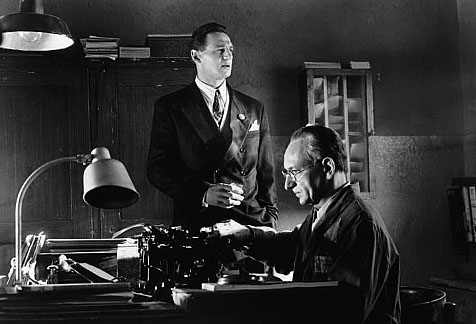
Steven Spielberg was the most successful filmmaker of the 1980's, and his box office might had no bounds. Yet, he failed to generate the same type of critical respect that his own directorial heroes managed to obtain in their careers. Yes, Spielberg attempted to make a move away from populist entertainments, with mixed results, in the form of THE COLOR PURPLE and EMPIRE OF THE SUN, but it was with SCHINDLER'S LIST that Spielberg hit critical respect and won his first of two Best Director Academy Awards. The 1993 film is a gut-wrenching and heart-breaking portrayal of the Holocaust that goes for, and successfully achieves, the level of verisimilitude that this subject matter demands and deserves. Outside of THE GREY ZONE, this is the finest of the Holocaust historical dramas, and is Spielberg's most personal and reflective of films.
7. UNFORGIVEN (1992)
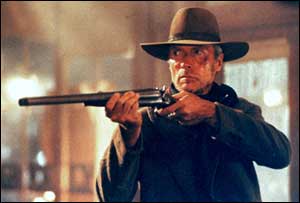
DANCES WITH WOLVES reinvigorated the genre of the western, one that was lethargic and did not generate much interest in modern audience sensibilities until it was released in 1990. Then came Clint Eastwood's glorious and moody UNFORGIVEN, which solidified the western's comeback in the early 1990's The film was a landmark for Eastwood, a revisionist western where the fine lines between antagonists and protagonists were blurry and the sense of old fashioned morality in its heroes were deconstructed and turned upside down. The film won Eastwood his first Oscar as a director, and harrowed in a new segue into Eastwood's future career as a director to be taken seriously as an artist, with works like MYSTIC RIVER and 2004's MILLION DOLLAR BABY. UNFORGIVEN remains, to this day, to be one of the great westerns of poetry, grit, gloom, and melancholy. It's one of Eastwood's most assured works.
8. FARGO (1996)

FARGO represents the best film of the Coen Brothers' whimsical and colorful careers. Their previous efforts were punctuated by stylistic flourishes and filled with offbeat characters and amazing images. That is all still there in FARGO, but it takes an existing genre (the caper gone painfully wrong) and spins is around a bit: what if the crooks were dim-witted and the police were equally moronic? That is the key to the absurdity of the Coen universe, which finds laughs even in the most dark and macabre subjects. The Coens find great delight in exploring what sort of lurks behind the A-typical American landscape, and also takes get pleasure in presenting the personalities in fresh, frank, and semi-satirical ways. FARGO is unmistakably and quintessentially all Coen Brothers, and their signatures are seen all throughout it.
9. THE MATRIX (1999)
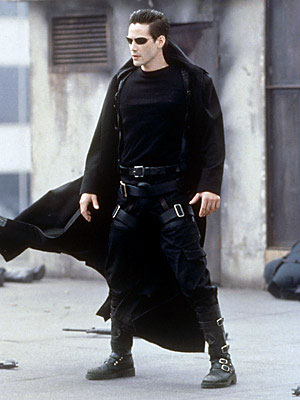
Whoa!? What's this film doing on my list, you may ask? Well, THE MATRIX is a film that I wholeheartedly warmed over to in a substantial way over repeated viewings, and time has been kind to it in the sense that it was one of the great transcending entertainments of the latter half of the decade. It's arguably one of the finest, most fascinating, and invigorating sci-fi films of the last 20 years, a wonderful concoction of comic book visuals and sensibilities, Eastern philosophies, semi-Biblical overtones, post apocalyptic angst, cyber punk aesthetics, and, yes, kung-fu. As strange as this broad amalgamation of characteristics are, it all works and meshes together fabulously in an entertainment that makes one both think about the meaning of perception and the powers and dangers of technology, not to mention that the actions scenes and visual effects (with its amazing and now infamous "bullet time" sequences) revolutionized the industry and have inspired countless insipid rip-off films ever since. THE MATRIX changed the look, feel, and mood of modern, contemporary action films, and I believe it rightfully deserves a placing on my list. And who the hell doesn't want to learn kung fu, especially in the gravity defying ways that the hero Neo and his comrades do?
10. FIGHT CLUB (1999)
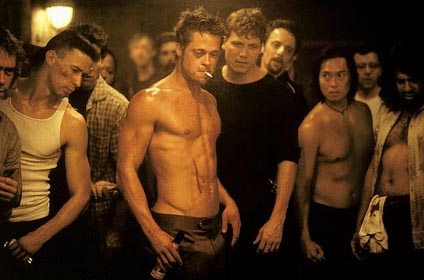
I am Jack's darkly humorous, oppressive, male angst- ridden satire. Without me, late 90's cinema would not be complete.
David Fincher's FIGHT CLUB is a film that draws a considerable amount of parallels to a similar film - A CLOCKWORK ORANGE. Both films are about violence and societal perceptions of violence, and both films kind of have a perverted view of mayhem - both maintain a sensibility of being anti-violence and pro-violence, which ultimately makes for a compelling work. FIGHT CLUB works all the way through its two hours like that, a film about modern men escaping their generation X status, slipping into their thirties, and all while feeling like their relative worth and identities are being striped away. The main character, played by Ed Norton, feels to be a slave to the Ikea cult, a lone figure who feels he inhabits a media and corporation driven society, but does not altogether inhabit it. FIGHT CLUB remains one of the 1990's most absorbing and challenging films because it addresses issues that plague the thoughts of many men who feel consumed by consumer culture, but also provides outlets for them to cathartically release their energies in ways that are morally reprehensible. It's a film that feels very representative of the decade, a dark, satirical, and nihilistic tale of people who have had it with the self-indulgency of their current times and want to do something about, albeit with questionable methods. FIGHT CLUB is always compelling and never boring, and you'll never look at soap the same way again.







